Stuart Millard's Blog, page 5
April 16, 2024
Euro Disney’s Grand Opening
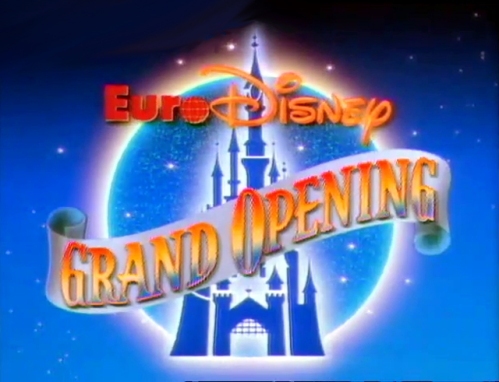
For a certain generation, there was no more exotic promised land than that of the theme park. Alton Towers, The American Adventure, and of course the king, Disneyland/Disney World. The mouse parks were so embedded in popular culture that a series of ads with Super Bowl winners made a meme of celebrating a victory by taking yourself there as a reward, highlighting this as the ultimate goal we should all be reaching for; the greatest treat there is. But us Brits could not go to Disneyland, unless in one of those families who took their kids out of school for a fortnight to Florida, returning with stories of seeing Gremlins 3 and getting off with a cheerleader (“Guess what ‘fanny’ means out there?!”). So far away, they might as well be on the moon, these magical realms inhabited our national consciousness as tantalising, perennial sights on television; in video packages about the United States, or as playground to sick and grieving children who’d been taken there by Noel Edmonds.
But then came Euro Disney, situated in Paris, rendering Mickey and pals reachable with a quick jaunt on the ferry — and in a couple of years time, on the Chunnel — putting it as close as the hypermarkets yer dad and his mates bought their cheap booze and fags from. Before the internet mushed our cultures together, as a country, we were fatally enamoured with the loud noises and unimaginable scale of America, in the global equivalent of getting all nervous around a foreign exchange student who smoked and wore a leather jacket. Exciting, bold, brash; this was the land where cool things came from, everyone either riding a skateboard or a horse, saying “have a nice day!” and living off three square meals of the kind of enormous burgers breakfast television’s ‘Stateside’ correspondents scoffed while turning a baseball cap sideways.

Both this crush and the excitement of a nearby Disneyland united in a live, two-hour television special, airing at 9pm on the night of April 11th 1992, counting down to midnight in Paris, when the ribbon would be cut and the gates would officially open. Broadcasting simultaneously in five languages all across Europe — and later in the day for American viewers — it’s literally just an enormous advert; perhaps the biggest, most sycophantic advert to ever air. Hosts for ITV’s version, and as such, ambassadors for the United Kingdom, are Pat Sharp and Matthew Kelly, each in their most powerful incarnations; Sharp’s blonde mullet coiffed at the top, shiny and luxurious at the back, and Kelly, bearded, Edmonds-haired, and with the wardrobe selections of a clown. Stood in front of the Houses of Parliament, the pair jump in a taxi to “the kingdom where magical dreams really do come true.”
The script’s comprised solely of this fawning language, where Uncle Walt’s not just the greatest storyteller, but the only man to have ever used his imagination, and there is no magic and wonder like that of Disney. On these points, everyone in the world agrees, unless there’s something wrong with them! Ironically, the dawn of the Euro park occurs right when the company are first beginning to emerge out of the ‘manky Disney’ era as seen in the Children’s Royal Varieties. In early ’92, it was slim pickings for Disney adults, Aladdin yet to be released, and recent breakout Beauty and the Beast still too fresh to have fully woven itself into the canon, leaving the brand reliant on imagery and characters from decades-old films; your Bambis and Dumbos and Alice in Wonderlands — films you still couldn’t buy on VHS — resulting in endless footage of wobbling Goofy and Tweedle-Dee costumes under orchestral renditions of When You Wish Upon a Star.

“Disney and children go together like rhubarb and custard” squawks Pat, introducing the seven little blighters with shite lives specially hand-picked by Bernardo’s to accompany him and Matthew to Paris. Once there, one of them can be heard loudly chattering away through the intro. This is Carlton’s raw satellite feed, with a time-code in the corner and black-screened during ad-breaks, and given our presenters, there’s a whimsical tone, links heavy on puns and office joker bants. “Here’s trouble!” says Pat, spotting Matthew at the airport. Consequently, it’s a strange collision of low-rent light-ent and A-List American production values, opening on footage of all the stars on the red carpet; JCVD, Michael J. Fox, Eddie Murphy, and then a parade down Main Street. It’s the Wacky Races we all dreamed of, old fashioned cars with George Lucas sat on the back waving under a rain of ticker tape, Donald Duck riding shotgun. Eddie Murphy’s vehicle is trailed by a group of dancing pumpkins, while Rosanna Arquette’s long-haired boyfriend has a camcorder glued to his eye, seemingly unfased by the Gummi Bear in the passenger seat.
Matthew and Pat have a clear system — whichever one’s talking, the other one’s mugging — and the way they’re dressed, Pat with his tresses and lovely gold bracelet, about six inches in height between them, they resemble a newlywed husband and wife on their dream honeymoon. Links have a hurried quality, squeezing in gags, plus endless facts and figures — “Sleeping Beauty’s castle can be seen for over two miles!” — before scheduled events begin, regardless if everyone’s finished talking. Matthew’s cut off by a fanfare signalling the castle’s lighting ceremony, mostly in un-subtitled French, where an enormous choir of children shout-sing When You Wish Upon a Star, which feels like watching someone else’s home video of their kid’s nativity. At the exciting climax, Matthew remarks “you don’t get fireworks like that in a ten bob box, and more’s the pity!”
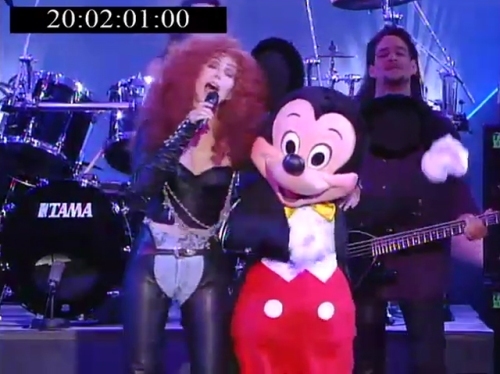
Throughout the night we’re treated to live musical performances. With enough hair for three women, Cher does The Shoop Shoop Song in leather chaps with a V of jeans just visible through a pussy window, before bumping arses with Mickey. Gloria Estefan rises out of a smokey trapdoor like Gangrel. Tina Turner, aged 52, is introduced by Pat as “a groovy granny,” and accompanied on sax by him with the muscles from Lost Boys — though for Disney, the titties are covered. The Temptations tag-team with the Four Tops, and Pat introduces Jose Carreras in the florid manner of a man ordering croissants on a first date. Big Ang Lansbury does the theme from Beast, and though she’s clearly miming to the soundtrack CD, who cares; it’s Lansbury!
In one of many videos, Walt’s nephew Roy Disney stands by a road sign in France, informing us this is where the roots of his family reside. He has the exact voice of stand-up comedian Steven Wright. I’m not sure on their maths, narration saying Walt’s family lived in France 900 years ago, and “a few centuries later” he served there in WW2 as an ambulance driver. Also, is it a bit weird and lazy that Walt just gave the company his own surname? Imagine if I switched things up, and 50 years from now, there’s a beloved animation company with dozens of classic films and a big roster of characters all under the branding of Millard. Wooo, I’m goin’ to Millardland! And you’ll be there too, because you’re a self-branded Millard Adult.

Pat Sharp, in a swivel chair with his legs open at 180 degrees, discussing legends, describes Matthew as a “leg end.” Unbelievable banter with these lads! Matthew’s own body language is so odd, fidgeting and bucking his back when he speaks, like a child reading aloud in assembly. He puts about a hundred syllables in the phrase “mind blowing” while stood outside Frontierland in a purple jacket and flowered shirt like the Joker. The Frontierland video demonstrates how Disney sees its own country, where the two genders are cowboy and saucy bordello lady; the latter arm in arm with tourist dads in early 90’s ski jackets. There’s energetic can-can dancing, one of those theme park shoot-outs where blokes throw camp haymakers and fall off balconies into horse troughs, a paddle boat and spooky mansion, and a train going through a mining town; a ride Matthew assures us is “double fab with a side-order of brilliant!”
Vox pops from staff have vast hostage video energy, each desperate to see their families for the first time in six months, and begging they bring tea bags and Kit-Kats to the grand opening. A woman greets loved ones back home, “especially my mother who’s just come out of hospital, I hope she’s feeling very much better.” Are these messages from greeters at a theme park, or the first astronauts on Mars? “Hi son, I know this transmission will take years to reach you, so you’re now older than me…” Incidentally, a month after opening, a full quarter of Euro Disney’s employees, numbering 3,000, would resign, citing poor working conditions.
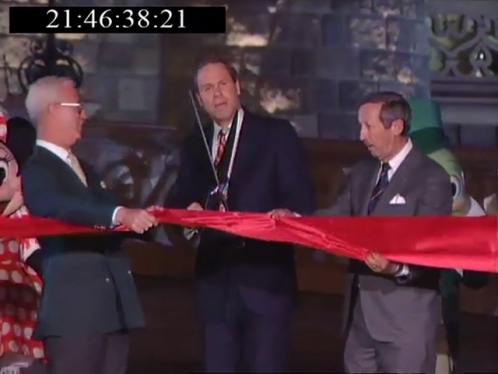
Life at a Disney park seems to be one parade after the other, and each VT quickly degenerates into more marching; more brass bands; old timey vehicles and old timey clothes, lack of contemporary output leaving them beholden to the past, as barbershop quartets perform jazzy renditions of cartoon standards. Everywhere you turn, the sound of that wah-wah trumpet with the cup over the end, and everyone waving; always waving. The boys spit more facts about how many tonnes of laundry the park will wash or swimming pools’ worth of soda they’ll sell, cueing in more exhausting medleys; high-kicking pirates in Adventure Land and Buffalo Bill’s Wild West Show — horseys and cap-guns, and nobody with their william tucked between their legs. The most startling thing is how cheap it all looks, costumes straight out of the dressing up box, though in Pat’s opinion it’s “fantastic, awesome, and definitely bodacious!”
For telly nerds like me who’ve never known affection, the raw feed brings extra bonuses, hearing producers inform Matthew his mic’s dying and they must “go with the hand mic!” Exhilarating. C-3PO speaks French to Jules Verne; Michael Jackson’s heavily-promoted Captain E-O segment finally airs, in 45 whole seconds of clips. With an anticlimactic eight seconds remaining, we watch the countdown clock take us home, to more fireworks and marching bands, Chip and Dale dancing, and Captain Hook with his face frozen in a well-pissed-off expression, like he’d rather be at home. Eisner dedicates the park under a brass band’s Zippedy Doo-Dah, reminding everyone of a film they made that was so racist, they can never show it again, then nearly takes another executive’s eye out with the giant Exorcist 3 shears that cut the ribbon — “my-oh-my, I got blinded today!” As he declares the park open, in French but no accent, a historical moment’s ruined by his voice pubescently cracking during the pivotal words “Euro Disney.” Mickey emerges from a doorway which bleeds blinding white light, like the aliens at the end of Close Encounters, beckoning us inside, rather fittingly, as the whole show’s been about forcibly dragging everyone into an overlit fantasy realm. “A world achievement from the whole world,” says Pat, waving goodbye. Within two years, the park would accrue $3b of debt.

For comparison’s sake, I also sat through the American version, taken from its CBS airing, in which hosting duties pass from our goofs to Hollywood power couple, Don Johnson and Melanie Griffith. Polished and cool, there’s far less mucking about, with Don super laid back, and Griffith suffering visible fanny-quake at the sight of him speaking French. It sets your heart racing just knowing, at that very moment, Sharp and Kelly were sat mere yards away, reading from an almost identical autocue. This one throws in a roving reporter with CBS sports anchor Pat O’Brien, though all the other footage and script is the same, albeit with the puns taken out. When Don discusses the gold rush, it’s without Matthew’s asides about “them thar hills!” and whatnot, and one wonders whether Matthew added them in, or the Americans took them out. Are they afraid of fun or summink? Also, the CBS version is sponsored by McDonalds and JCPenny, because of course it is.
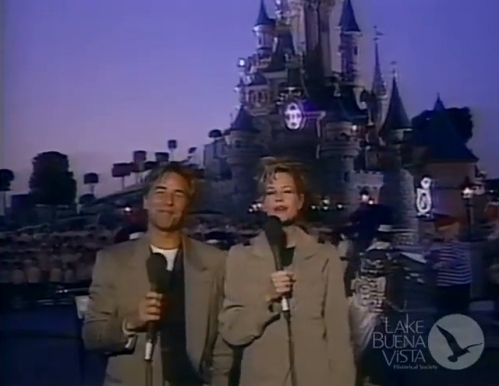
This is a great exercise in interpretation, with Griffith’s sedate reading of facts and figures Matthew Kelly found cause to gurn over. While Pat’s making Biggles flying goggles with his hands, this pair joke about Lady from Lady and the Tramp becoming a redhead when she moved to Hollywood. Don will describe the Gypsy Kings as “talk about music from the soul.” “Straight from the heart,” agrees Melanie, and perhaps their status affords a less detached and wowed presenting style than Pat and Matt; more of a mutual appreciation society from one celebrity to another. “In the biz, they call that a great hook,” says Don following a performance by “some old pals of mine,” Gloria Estefan and the Miami Sound Machine. In a real Rashomon moment, if we peek over Pat O’Brien’s shoulder, who’s that colourfully dressed bearded giant? Why, it’s our Matthew! “Uniting the world in the name of Disney,” says O’Brien. We also get a look at all the other film crews, to learn what the European equivalents of Pat Sharp look like. No surprise, it’s a gorgeous Italian lady. The EU are laughing at us!
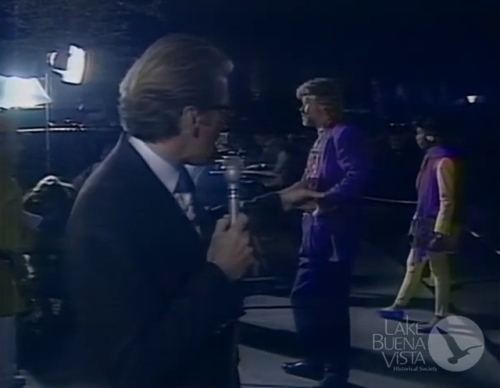
Though us Brits didn’t have that extra sexual tension, and when Don says “of course as we grow up, we learn that life doesn’t always guarantee a Prince Charming or a happy ending,” Melanie gives him a knowing look most men will never be lucky enough to receive — “well…” One person who definitely preferred the CBS version was Tina Turner, elevated in her intro from groovy granny to “the hardest working woman in rock and roll.” But if there’s one thing that unites our nations, and indeed the entire world, it’s that we love the magic and wonder of Disney, don’t we? DON’T WE?! Matthew Kelly wouldn’t lie to me. Certainly, in being repeatedly assured that you fucking love Disney for two solid hours, there’s a risk of giving in and letting yourself get swept up in it, like those videos of megachurch faith healers sending members of the congregation flying with the barest touch. Here comes Pat, blonde mullet swaying as he moves down the line, parishioners going down like Norman Wisdom on a banana skin. But when he gets to you, are you just gonna stand there, or will you be thrashing around on the floor, eyes rolled back, speaking in tongues to the tune of Wish Upon a Star?
…
This piece first appeared on my Patreon, where subscribers could read it a month before it landed here. If you’d like to support me for as little as £1 a month, then click here to help provide the world with regular deep dives about weird-bad pop culture, early access to my videos, my podcast, and all kinds of other stuff.
There’s a ton of content, including exclusives that’ll never appear here on the free blog, such as 1970’s British variety-set horror novella, Jangle, and my latest novel, Men of the Loch. Please give my existing books a look too, or if you’re so inclined, sling me a Ko-fi or some PayPal cash.
March 30, 2024
We Need to Talk About Keith
…
This video first appeared on my Patreon, where subscribers could watch it a month before it landed here. If you’d like to support me for as little as £1 a month, then click here to help provide the world with regular deep dives about weird-bad pop culture, early access to my podcast and videos, and all kinds of other stuff.
There’s over 660,000 words of content, including exclusives that’ll never appear here on the free blog, such as 1970’s British variety-set horror novella, Jangle, and my latest novel, Men of the Loch. Please give my existing books a look too, or if you’re so inclined, sling me a Ko-fi or some PayPal cash.
Interceptor: A Squawk to Remember
…
This video first appeared on my Patreon, where subscribers could watch it a month before it landed here. If you’d like to support me for as little as £1 a month, then click here to help provide the world with regular deep dives about weird-bad pop culture, early access to my podcast and videos, and all kinds of other stuff.
There’s over 660,000 words of content, including exclusives that’ll never appear here on the free blog, such as 1970’s British variety-set horror novella, Jangle, and my latest novel, Men of the Loch. Please give my existing books a look too, or if you’re so inclined, sling me a Ko-fi or some PayPal cash.
March 11, 2024
The Mike Reid Show
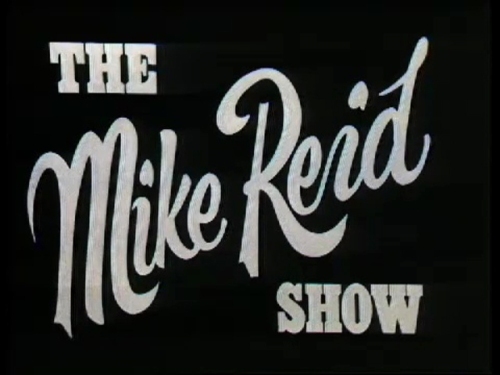
The Mike Reid Show is basically what Tara Palmer-Tomkinson thought she was walking into on her sadly infamous appearance on The Frank Skinner Show, and not, as she had believed, The Frank Butcher Show. The personas of Reid and Butcher and inseparable, other than the former not having run down Martine McCutcheon on New Year’s Eve, so if Mike Reid’s hosting a show, then Frank Butcher is too. This is the same variety vehicle they gave everyone for about forty years — The (Host’s Name) Show — opening monologue, sketches, celebrity guests and musical performances, though in this, we’ve the most aggressive performer to have ever been given one. You’d think a man who seems like he should be bare knuckle boxing in an empty swimming pool would despise song and dance, but those deep into Reid lore will know that, like all club comics, he dabbled in the charts, with novelty singles Ugly Duckling and Freezin’ Cold in 89 Twoso. Even so, he never embraced that side so overtly, so spectacularly, as in The Mike Reid Show.
I was as shocked as you when I stumbled on this; a series so consigned to the skip of history, Reid makes no mention of it in his autobiography. It’s essentially a one-and-done, but spreading out its six episodes and a pilot — guest starring future EastEnders missus Babs — across three years. Series proper begins a year after the 1976 test-run, and I’m jumping in with episode three, opening on dramatic spotlights, and Mike descending glittery steps in a dickie bow, not unlike the revolving one he wore when showing up at Pat’s backdoor in the nip. During more physical gags, a big medallion will fly out from the suit’s inner breast. Pre-dating Runaround, Reid’s yet to hit the final evolution of the look, missing the yellow-tinted glasses and oak finish tan, and still clinging onto a full head of hair. All these shows have to kick off with the monologue, running through gags about “foreign birds” and touching on the peculiarity of language; “there’s no black friars in Black Friar, all the chip shop owners are white!” Though this is firmly his domain, there’s a sense he’s on his best behaviour, with no jokes about fingering, nor miming himself having a tommy tank.
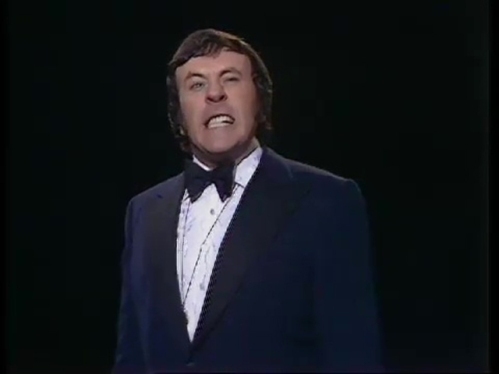
No matter how I try, I can’t wrap my head around Reid being eight years younger here than I am now. I would’ve have left sixth form before this Reid even started big school. I’d have watched Andi and Emma, while he had Theakston and Ball. I won’t have it. Yet, if I went back in time to the day he was born, baby Mike Reid would still be threatening me with a clip round the ear. His routines feel like being lectured to in a post-death abyss, black suit lost against a black background, with only face, hands, and white collar and cuffs visible, as though Red Dwarf recast the ship’s computer again. Your eyes are drawn to the movement of his great big mitts, exactly resembling when someone feeds their hands through your arms from the back and gesticulates wildly while you pretend to read the news.
The last time we saw Reidy doing sketches was Pussy in Boots, but first he had a crack here, gritting his teeth during a card game in an visually nauseating living room. Wallpaper, curtains, cardigans; all disgusting, in a decade whose entire colour pallet was ‘some sick under sawdust on a wooden floor’. Another sketch sees Reid at a health farm, with a hairy health and safety moment, climbing a rickety wooden ladder to straddle a chandelier and retrieve a hidden sandwich, dangling about fifteen feet above a rock-solid studio floor. This easily could’ve been pre-courser to Davro in the stocks, left hanging for a long, single take, while co-stars sneak about below for their own hidden stashes; a loaf in the fireplace, a parsnip disguised as a candle; and confuse each other for ghosts. Eventually, he has to clamber back down, manoeuvring himself (in a dressing gown, mind you) off the chandelier and back onto one of those ladders kept only from doing the splits by a fraying piece of string. You know Mike Reid wasn’t killed in an accident in 1976, but you’re still half expecting to see a foot go the wrong way, his head crack open, and the screen to suddenly cut to black.
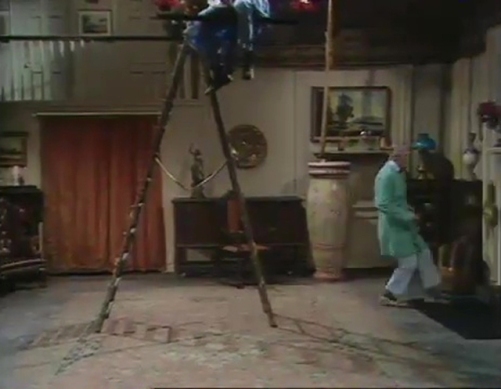
There’s a weekly song from regular cast member, Patsy Ann Scott, who’s second billed, but is most notable (in the Millardverse) for going on to marry Eddie Large, staying together until his death. Perhaps, as she does Reidy, Patsy once serenaded the big man with Love Is A Many-Splendored Thing. Joining Reid for a chat, he politely offers her “a Michael” (a mic) and slips an arm around her as they break into Nat King Cole’s Almost Like Being in Love while making goo-goo eyes at each other. Wonder if Syd ever wound Eddie up by sticking this on in the tour bus? But it’s unnatural, watching a man we’ve only ever seen telling jokes about Indian ladies’ fannies and geezers with a right fahkin pipe down their trousers, now being all classy, sat nicely on a stool enunciating every word through a smile — and not his usual ‘chimp whose territory has been threatened’ one either. It’s like when your mum uses her posh phone voice, and the cockney beast within must be fighting to get out during every number; dry slaps and “shut it, you wilf!” bubbling beneath the surface as he tells himself “keep it together, old son…”
Consequently, the show’s overwhelming vibe is of catching an authority figure’s private side you weren’t meant to see, like walking into double maths of a Monday morning with a “nice seeing you at the orgy last night, sir, you were at it like a piston!” Mike Reid in a tuxedo, eyes closed and arm outstretched as he belts out a showtune; you might as well’ve taken a VHS labelled ‘yellow fun’ from your parents’ bedside drawer and pressed play. This man, however, is a pro, and when it goes big band, it is Frank, but Sinatra rather than Butcher. It’s the bridging stand-up sections where he’s most him, with jokes about Streisand’s big nose and fellas who died and went to ‘eaven and ‘ell, aided by unbelievably truculent mimes, thrusting imaginary sausages into his mouth like he’s trying to smash out his own teeth. And then he’s in a collar so wide, it’s basically a skate park, medallion and chest hair on show, for a solo number of Ella Fitzgerald’s It’s a Lovely Day Today, strolling round the piano, sharing a little wink with the bass player, pinkie gracefully encircled round the bottom of the mic, miming the pitter patter of raindrops with his big fingers; a point at the camera on the final tinkling note, before shaking the pianist’s hand.
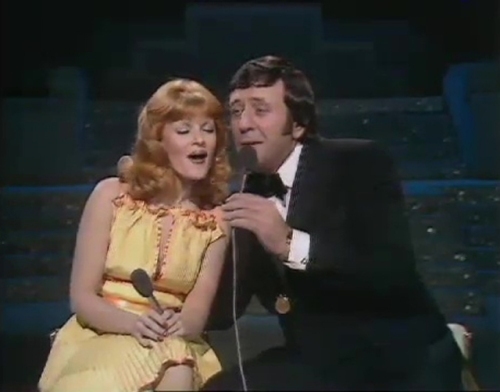
But Dear God, the lurching tone. Pure jokester Reid, telling a gag about being a teenager and hoping girls he’d cum in on a Saturday night didn’t get pregnant, and then — POW! — a pianist playing Rachmaninov — SOCK! — Reid accidentally sawing a woman’s leg off in a sketch — OOF! — a brown leather armchair, and “we hope you like the selection of songs from the pen of Cole Porter.” This is the classy end of variety, a hundred miles from Bernie Clifton, with breathless choreography and 1940’s Hollywood wipes, and not just the lead-in to a skit where Reid gives one of the male dancers a biff up the hooter for being a bleedin’ fairycake. To confirm, the camera pulls back, putting that armchair centre of frame, and there he is, lit cigarette between two fingers, glass of scotch and an ashtray, mournfully crooning Just One of Those Things — “goodbye and amen, here’s hoping we meet now and again” — taking a drag between lines, with a close-up of him stubbing it out at the finish.
Hard cut to a weedy dancer with a cowboy hat slung behind his neck slamming a bullwhip against the floor so camply it seems like a bit from Dick Emery. A Western-infused dance medley, Reid joins for the closer with Night and Day, imploring us to end his torment, and “let me spend your life making love to you.” Can I get back to you on that? I imagine his lovemaking style is rather like an untethered bureau being thrown around in the back of a removal van. Though the earnest singing has outweighed the comedy by some margin, one couldn’t rightly call it Yarwooding, as this is just an entertainer fully living up to their job description. Surprisingly, given the noted lack of racial epithets, is seeing Johnny Speight as one of three credited writers.
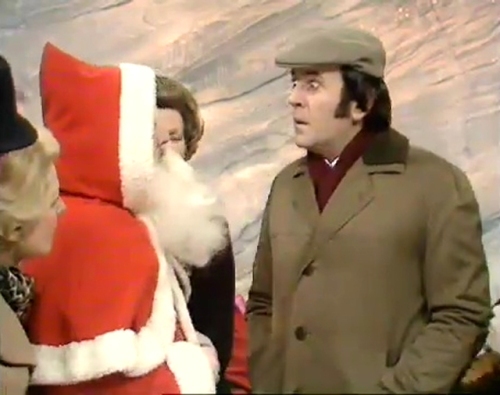
The next episode’s opening routine seems ill-rehearsed, rife with pauses and stumbling, and despite airing in March, sets up a sketch in a Christmas grotto, with Reid playing his own father, in the expected six minutes of beard-pulling, shouting, and calling Santa “winkle.” Other sketches see Reid as a cockney vicar, using the Chalky voice as “one of our imported locals,” and at a fancy dinner where Felix Bowness is a waiter, and a young woman goes cross-eyed at whatever Reid’s doing under the table. But the absolute centrepiece is a song and dance medley set in 1920’s prohibition America, dancers all in gangster suits, concerning a feud between mob boss Fingers Aldino (“he’s the greatest gangster we know!”) and Reid’s Big Boy Mike Angelo.
This is flawless casting for once, Reid with shoulder holsters, doing some words in an American accent, and singing (lip syncing) “I’m the king, I’m the king of Chicago!” Flapper girls look on adoringly as he segues into It Had To Be You, embracing Eddie Large’s wife as she sits on his lap. If Eddie was into cuck stuff, this bit of the tape would be worn out. After shooting at him with a cap gun, Reid and Fingers get into a dancey fight, but bond over an arm wrestle and everyone leaves the club as friends, for a full Broadway song and dance, giving a taster of Frank Butcher as the lead in Guys and Dolls. “We’re pals now in Chicago town, it’s Fingers and Mike Angelo, two buddies in Chicago town, just watch a partnership grow!” He even does a soft shoe shuffle, and then absolutely fucking nails the ‘ending the song at the penultimate word to suddenly switch to a speaking voice’ with a gentle “goodnight everybody, thanks for watching.”
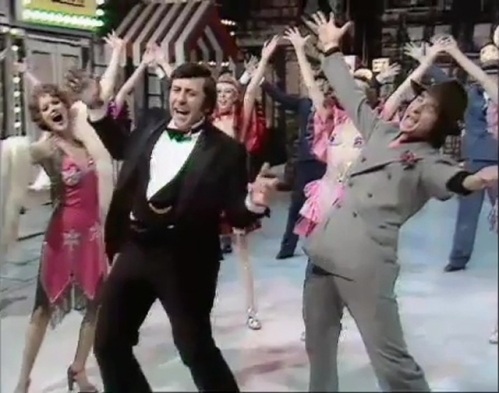
Episode six, the final show, mysteriously aired almost a full year (51 weeks) after the previous one, complete with new opening titles and theme. It’s also much faster paced, lighter on variety and way more sketchy, the stand-up now a quick set-up for the many skits. Mrs Eddie Large and the weekly pianist are gone, along with the dance troupe, replaced by The Dougie Squires Dozen. Was this the planned beginning for a revamped second series which never came? As a warning before we proceed, the solo writing credit is a man who penned gags for Little and Large, Barrymore, Jim Davidson, Bobby Davro, and Copy Cats.
And yet, what an opening! At no point would anyone ever think to precede the introduction of Mike Reid with a slinky, energetic cover of The Rhythm of Life. Silver-suited dancers peel away one by one — “we’ve got rhythm, Mike’s got rhythm!” revealing the man himself, blue tux and flared trousers, to wish a very energetic “Good evening! You know, I was born in the East End of London, born in the sound of bow bells…” Yeah, you might have mentioned it. But the music’s still going, and he’s walking and talking — about London, about jellied eels at old Tubby Isaac’s — in what’s effectively a proto-rap, betwixt singing “I’ve got rhythm” as he strides through the dancers in a brutal fusion of disco, rap, and EastEnders. Honestly it’s one of the most powerfully weird openings since those kids breakdancing in Cilla Black’s living room, grooving like Austin Powers, right up to the camera, in easily a Top 3 most baffling thing I’ve ever witnessed.
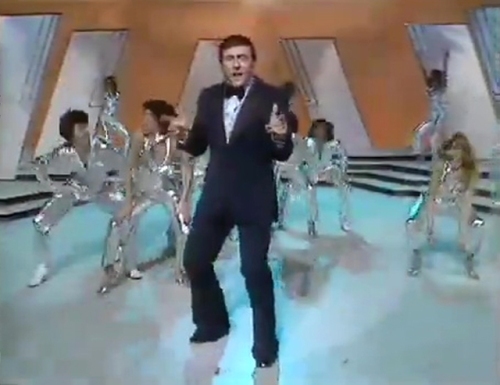
Once that’s out of the way, compared to previous episodes, this is The Fast Show; sketch after sketch, mostly themed around Mike Reid’s Stages of Life. First the wife’s telling him she’s pregnant (“What would you say if I told you that soon we’d be having another hungry mouth to feed?” “Your mother’s coming to stay?”) before he posits ‘what if men had babies instead?’ — “Wouldn’t make half as much fuss as you girls, no way!” Though they give us the concept of a pregnant Mike Reid, they chicken out of the actual visual, post-birth in a hospital bed, robbing us the money shot of Frank Butcher with a massive pregnant belly. It’s fine, I’ll just commission someone from DeviantArt. Regretfully, it’s never clarified where the 11lb baby comes out; caesarian, arse or nob-hole.
The vague, whistle-stop tour of his life continues; as a drill instructor training a regiment of spivs in WW2, a classroom tale of sitting next to Ginger Thompson who shat himself, crying about the mother-in-law at his wedding day, and an alternative world where he went to actual uni instead of the University of Life, and works as a judge hosting a University Challenge parody (“What’s the penalty for bigamy?” “Two mothers in law!”). He’s clearly trying to get a pair of new catchphrases over, cutting off audience applause by barking “Migraine! Migraine!” about a dozen bloody times, and peppering routines with an impatient “Listen! Listen!” One thing he wants to be very, very clear about in his reminiscences is that Mike Reid did a lot of shagging in his younger days. “I had dozens of birds, I made Tom Jones look like a Trappist monk!”
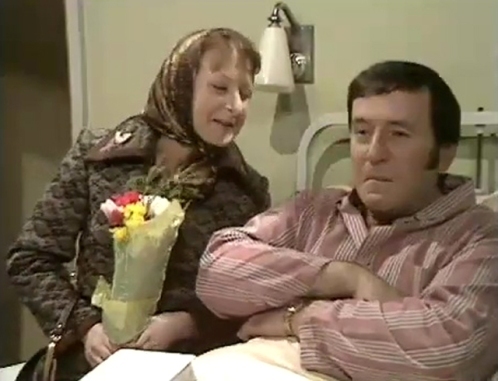
But now a bonafide sketch show, one simply cannot escape the 1950’s American rock and roll bit; everyone sock-hopping round the jukebox like they’re in Happy Days. Although unlike your Davro, Dennis and Abbots, Reid actually was a teenager during that period, albeit in Hackney and not Milwaukee. In the whole lengthy medley, quiff wig and teddy boy swagger, he looks seventy years old, and couldn’t seem more ‘dressed too young’ if he was in a babygro. It doesn’t stop him though, surrounded by young dancers and belting out Johnny B. Goode. “Frank, it’s your cousin Marvin! Marvin Butcher!”
The Mike’s Life concept is abandoned in the final third, translator for a party political broadcast, where Labour’s a Yorkshireman in a flat cap, the Tories a haughty woman, and like all comics of that era, Reid gives trade unions a kicking. Back to the good old days of the music hall, he does Billy Cotton’s Marrow Song — “oh what a beauty, they’ve never seen one as big as that before!” — and he would’ve been right at home with Formby and them other lads, back when nobody noticed a full 100% of comedy was double entendres about wanking and great big fucking veiny dicks that’d split you in half. Plus he still does all his gags about thicko Irishmen and getting the mother-in-law a job as a lollypop lady at Brands Hatch.
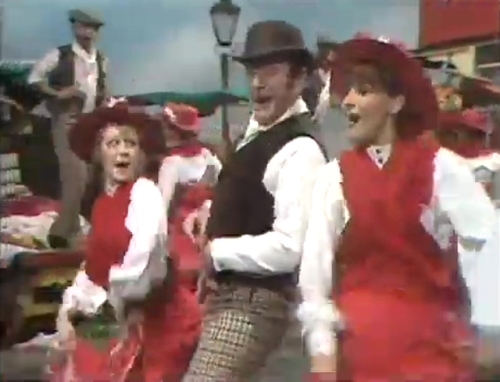
Fittingly, the big finale is one of the most cockney things in all of recorded history, inviting us to join a sing-along “dahn the market!” Thumbs in the lapels of his waistcoat, he opens the medley with Oliver‘s Oom-Pah-Pah, and as dancing girls shake their skirts, all I can think is what a fantastic Bill Sikes he’d have made. In a real East End masterclass, even I’m Henry the Eighth, I Am makes it in, though the set design’s a bit muddled, with Victorian clothing but a red phone-box and double decker bus, the top deck of which Reid closes from, bidding us “goodnight, darlin’s, I hope you enjoyed the show. Gawd bless yer!” You know, I think I actually did. Mike should’ve swapped the flamin’ pilchards for tap shoes a bit more often.
…
This piece first appeared on my Patreon, where subscribers could read it a month before it landed here. If you’d like to support me for as little as £1 a month, then click here to help provide the world with regular deep dives about weird-bad pop culture, early access to my videos, my podcast, and all kinds of other stuff.
There’s a ton of content, including exclusives that’ll never appear here on the free blog, such as 1970’s British variety-set horror novella, Jangle, and my latest novel, Men of the Loch. Please give my existing books a look too, or if you’re so inclined, sling me a Ko-fi or some PayPal cash.
March 1, 2024
This Is Your Life: Everything is Connected
…
This video first appeared on my Patreon, where subscribers could watch it a month before it landed here. If you’d like to support me for as little as £1 a month, then click here to help provide the world with regular deep dives about weird-bad pop culture, early access to my podcast and videos, and all kinds of other stuff.
There’s over 660,000 words of content, including exclusives that’ll never appear here on the free blog, such as 1970’s British variety-set horror novella, Jangle, and my latest novel, Men of the Loch. Please give my existing books a look too, or if you’re so inclined, sling me a Ko-fi or some PayPal cash.
No, The Other 90’s Gaming Show: Bad Influence
…
This video first appeared on my Patreon, where subscribers could watch it a month before it landed here. If you’d like to support me for as little as £1 a month, then click here to help provide the world with regular deep dives about weird-bad pop culture, early access to my podcast and videos, and all kinds of other stuff.
There’s over 660,000 words of content, including exclusives that’ll never appear here on the free blog, such as 1970’s British variety-set horror novella, Jangle, and my latest novel, Men of the Loch. Please give my existing books a look too, or if you’re so inclined, sling me a Ko-fi or some PayPal cash.
February 12, 2024
The Experiment

When I started the Patreon in 2018 and begun listing things I wanted to cover, this series was top three, with one particular image seered into my brain as the most broken anyone has ever been by reality television; a statement I believe still holds true today, even given the untold thousands of hours of broadcasting since. Frustratingly, actual footage was elusive, outside of learning institutions, who use it as a source in psychological training and it’s a real curate’s egg, unavailable on DVD, iPlayer or YouTube, but viewable if you’re taking an A-Level psychology course, where it’s used as a teaching module.
In 2002, reality TV was reaching the end of that brief era where it could truthfully label itself a social experiment. Big Brother was only two series in, with people still yet to start properly acting up in front of camera or consciously using it as a springboard to fame, while producers hadn’t begun the sole casting of ‘characters’ who’d boost ratings with outrageous behaviour; a sea-change solidified in the headline-grabbing wake of Big Brother 5, after stinky reviews for the boring previous series. Still, none quite so lived up to their name — before or since — as BBC’s The Experiment, whose brief run was enough to cement it, in my mind, as one of the great reality shows. Though perhaps only reality TV by modern definitions of ‘real’ people being put in a situation and filmed, warts ‘n all, the premise had been done before, without cameras present, under its infamous title, The Stanford Prison Experiment.

The original 1971 psyche study saw a group of young male volunteers randomly divided into prisoners and guards, in a pretend prison down in Stanford university’s basement, to test how people react when given power over somebody else. Meant to run for two weeks, it was ended after six days, when ‘guards’ became excessively violent and abusive, although it later turned out the guy who ran it mostly lied about what happened. There’s been myriad narrative movies based on the given story, but the BBC were the only one to attempt a full, factual do-over, and theirs too — “a unique scientific experiment into power and rebellion” – would be halted early.
Filmed at the George Lucas Stage of Elstree Studios in December 2001, the resulting four one-hour programmes were broadcast on May of 2002. Applicants didn’t know specifics, merely told there was no prize money, and that it was a “university-backed social science experiment to be shown on TV.” However, according to a YouTube comment from one of the guards (who now posts Sonic the Hedgehog speed-runs), word got out it was a remake of Stanford, and they all read up on it, becoming determined not to let themselves become a brutal guard like in ’71. In hindsight, this may have been why things unfolded the way they did. Still, it must’ve been a shock for those selected as inmates, immediately put in jumpsuits and getting their heads buzzed, Full Metal Jacket style. The set feels more like Oz than Porridge; a futuristic fortress of grey stainless steel, inmates behind doors and wire fencing, with balcony levels and huge fluorescent lights on the walls and floor, bathing everything in perpetual glare.
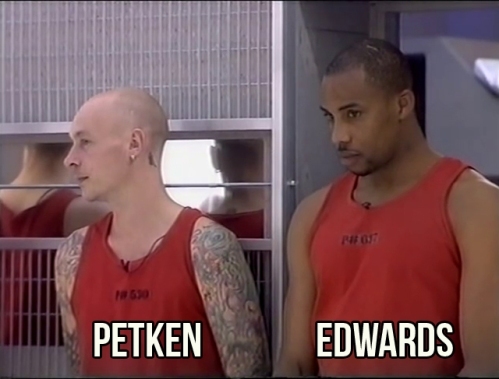
The fifteen men, meant to “represent a cross section of modern Britain,” are split into four guards and eleven prisoners — supposedly randomly, but I’m not buying that. Despite being an academic study, there is a level of manipulation, with cellblock pairings obviously contrived for maximum mayhem, and there are frequent references to the heat of the prison set, which keeps everyone sweaty, mad and sleepless. Of these man, some will barely get a line of dialogue in the whole enterprise, as proceedings become dominated by the personalities — and actions — of four men. Two of these form an instant alliance, in new bunkmates of Cell 2, John Edwards and Paul Petken. Edwards is a reformed bad boy, now Christian evangelist youth minister, while Petken’s a stringy ex-crack addict and unemployed brickie, clean seven years after puffing on the rock “big time” from 13-18. A shaven head and tat-filled arms, he resembles the bald one out of the East 17 lads who don’t do anything. With mischief in their eyes, the pair seem to instantly recognise like with like.
Two university academics running things are set up in a nearby room — kept nice and cool with big fans — eating crisps and watching on a bank of monitors, sworn not to interfere with the process. There are strict guidelines in place to ensure no participant suffers “lasting damage,” overseen by a panel of seven independent experts who’ve got the power to shut things down at any time. There’s also daily questionnaires, and urine and spit tests, to monitor everyone’s stress levels. The guards have been given no training, and simply have to figure out between them how to keep control, over ten days of prison routine.
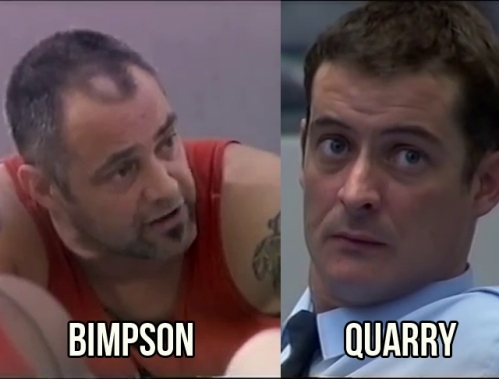
On Day One, meal one — badly-cooked small portions meant to stir bad feeling — Petken makes a theatre of throwing his plastic fork down in disgust; “ain’t even cooked properly, mate!” Meanwhile, in the guard’s mess, it’s flank of beef and roast peppers, with enough for seconds. All this is engineered to emphasise the imbalance of power, preceding the first test; the promise of promotion for one prisoner to a guard position. Edwards is keenest, remarking in a video diary “I’d be fair, but I’d be firm,” but most existing guards are uneasy in their role and the privilege it brings. Guard Tom Quarry, another of the aforementioned notable foursome, and CEO of a multimillion pound tech company, is worried they’ll drift into tyranny, going the way of Germany in 1935; “that wave swept the country, and it turned a nation mad!”
The first three days are so uneventful as to be covered in 20 minutes airtime. In Day Two’s biggest drama, the guards’ offer of leftover sausages from a big fry-up is refused by inmate Phillip Bimpson. Bimpson, last of the big four, is a physically imposing 40-something scouser; muscular, a karate black belt, and a self-styled alpha male. Fiercely anti-authority, he’s not interested in the guard job, for which candidates are interviewed on Day Three. Edwards does not land the role, and makes a bad fist of hiding his disappointment. With the new guard a quiet lad who fades into the background, the only change in dynamic relates to who didn’t get it.
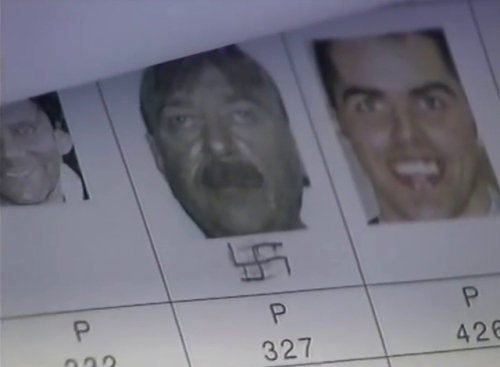
On Day Four, with the promotion gone, prisoners have no incentive to behave, leading to taunting and the theft of a pencil, which results in a picture of guard Brendan Grennan — the oldest participant — being defaced with a Hitler haircut, tash, and swastika (complete with rub-out lines indicating it took the vandal a few attempts). Bimpson’s chatting up Petken and Edwards about Hitler’s rise, and a book “by a guy called George Orwell,” with a knowing glint while describing the pigs taking over the farm. In the guard quarters, Guard Ahmed perceptively brings up the scene in Jurassic Park where it’s only a matter of time before the dinosaurs start thinking for themselves. There seems a looming sense of dread for the guards, too afraid to assert any power — perhaps due to that research on Stanford — and aware this will inevitably lead to trouble.
Anyone who’s watched a prison movie knows the tension comes from population imbalance. Inmates outnumber guards, and if they decide to, could take the place at any time. Petken and Edwards see the route for this in targetting the weakest guard, “the most timid one,” singled out as Tom Quarry, with plans to corner him in the yard and take his keys. Quarry’s well-meaning, but fatally lacking in nous, with the street smarts of a brick, and would be caught out by that ‘point at a stain on their chest and touch their nose with your finger as they look down’ gag 100% of the time. Coming from the office world, he believes conflict is revolved by meeting in the middle, never realising, in a prison environment, he’s getting fucked every time. Cell 2’s exchanges with Quarry are constant mind-games, unsettling him with aggression which is then turned friendly; “I’m only jokin’ Mr. Quarry!” Third celly of block 2, a nervous 22-year-old called Kevin, warns such behaviour might push the guard into a breakdown. “Yeah, good,” says Petken.
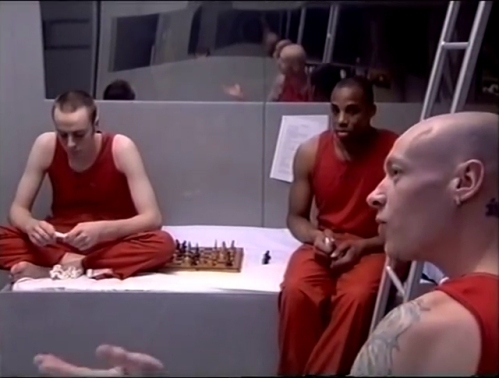
One funny personality point of Edwards is how the constant talk of prison anarchy and tormenting his oppressors is filtered through a recent born-again conversion, meaning he can’t swear — “I’ll stand up and say ‘I’m flippin’ sick to death of this food’… just throw it down on the flippin’ trolley!” His interactions with guards are petty back-and-forths, carrying himself with the manner of those people who stormed into hospitals during the pandemic, trying to arrest nurses by quoting from the Magna Carta. He batters guards with broken logic-traps and the need for proof, constantly using his catchphrase “I rest my case!”
The experiment seems like an exercise in how long it takes for prisoners to realise the guards are set up to fail. All they can offer as punishment is bread and water rations or solitary confinement; rarely suggested and even more rarely followed through, grinded away with Edwards’ faux-lawyerly waffle, or by the guards themselves, divided by the psychological warfare, and so afraid of going Stanford they’re unable to settle on a course of action. First real confrontation starts with Edwards swiping his plate against the wall — “I’m flippin’ sick and tired of this crap!” Everyone’s ordered into their cells, but Petken and Edwards refuse, leading to a scene which plays like a bloodless cover of every argument outside pubs of a Friday night. Both sides know they can’t touch each other, resulting in posturing from the aggressors, and lost-face for the guards. In the end, there’s no punishment, with Quarry, who just wants to make friends and have a quiet life, settling on handing out cigarettes, so long as they return to their cell. The naughty boys high five, while Ahmed concedes “now they can do whatever they want.”
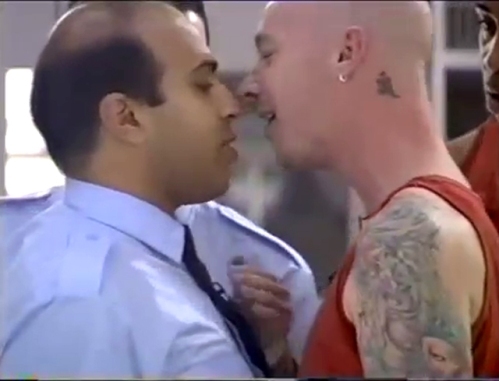
Sure enough, minutes after the truce, Edwards and Bimpson taunt Quarry through their cell doors, inciting an unexpected outburst from Quarry in the guard room of “I’m not gonna give them the steam off my shit!” Ahmed joins in with; “they’re nothing but piss, they’re nothing but a bubble of your piss.” Over dinner, Edwards informs the other cells of his next plan, codename OPERATION MAYHEM, which involves putting blu tac over the magnets which lock the cell door, and then taking the prison until the experiment ends. Bimpson cites historical revolutions, seeing this as “a military junta to take over the ruling class,” remarking rather regretfully “we can’t kill any of ’em or set fire to ’em.” Here there’s a superb hard cut to the guard room where, over one of their lovely big dinners, Quarry talks about a carving class he went to in the Strand, where he was taught the best way to cook a Christmas turkey, “so that when you cut it, the knife squeaks.” Smash the system!
Day Five sees the arrival of a new inmate. Charles Manson?! No, of course not; a man whose entrance was delayed “because he has particular skills,” in retired trade union negotiator Derek McCabe. McCabe’s tricked into handing over the pencil from his psyche questionnaire — contraband — which Edwards and Petken use to write out their new prison rules. Rule one, after earlier goading Quarry into swearing, is “no foul and abusive language.” They pull Quarry up on improper attire, as his badge is “a bit wonky” and state their desire to lead a morning inspection of the guards. After a brief chat with McCabe, Quarry’s so rattled, he’s suddenly pitching a utopian society with no roles, “a bloody commune,” but on broaching it to the psychiatrists, senses they aren’t keen, so that’s that.

While all this is going on, Bimpson’s been secretly nicking various prison equipment — dustpan, bog roll, some towels — and when mopping an unattended guard station, swipes the master keys. Petken uses this as another excuse to torment Quarry, making out he’s the thief, and will return them if allowed a cigarette. When Petken finishes the fag and breaks the news he’s not got them, Quarry’s crestfallen and betrayed — “I shook a man’s hand there” — having to walk out under a rain of Spartacus cries from every cell of “I’ve got the keys!” “No, I’ve got the keys!” Inmates elect McCabe as spokesman for a sit-down with the guards, angering Bimpson who wants to use the keys as leverage, because democracy’s “just arguin’ about shite!” and just a few hours after his arrival, McCabe negotiates return of the keys in exchange for daily hot drinks, plus amnesty for all prior rule breaks.
Having served his purpose, and proven himself too powerful for a show which needs some chaos, McCabe is immediately removed from the experiment, announced to inmates as ‘for health reasons’ so’s not to rouse suspicion. Bimpson is thrilled. Not so Quarry, who’s nervously chewing on a pen whenever the cameras find him. Psyche tests show guards are depressed, stressed and demoralised, and inmates happy as Larry. Cell 2 once again plot to single out and destroy Tom Quarry, with more head games leaving him in the officer’s mess suckling on a biro like a baby’s dummy, thousand yard stare, and sharing fears the prisoners are somehow going to lock them all in. While everyone else is hot blooded with rebellion and OPERATION MAYHEM, the quiet lads of Cell 3 are compiling a list of 100 best movies, “The Sound of Music, Chitty Chitty Bang Bang…”
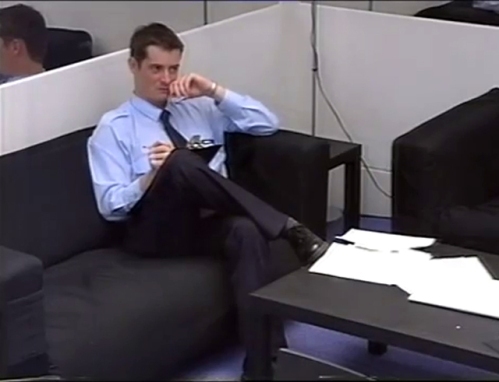
Via the one-way camera booth, Petken clears a potential night-time breakout with psychologists, who simply tell him no violence or getting out of the set. Earlier, he discovered ceiling light panels could be jimmied, and planned an after dark crawl up there, to drop down into the kitchen, but sadly this isn’t Channel 5’s Jailbreak with Craig Charles, and production put in a call to stop him getting electrocuted. In the run-up to MAYHEM, Petken’s increasingly aggro, calling guards “muppets,” and implying they’re getting erections from the power. “You lot make me sick to the back teef, mate… you lot wanna watch yourselves.”
His and Edwards’ relentless bullying of Quarry becomes a genuinely uncomfortable watch, and starts to wind up other prisoners, with even Bimpson describing Edwards as “a fuckin’ shit stirrer.” It’s classic bad-faith behaviour we all recognise from school, where some kid’s poking you with a pencil all day and when you finally react, they’re all “Whoa, calm down, mate! What are you swearing for? That’s very offensive!” As part of his efforts to integrate both groups, Quarry devises a joint rec time, and plays a “friendly” (in quote marks twenty feet high) game of chess with Edwards. Narrator David Suchet remarks “the underclass does not want to make friends with their masters, it wants to make fools of them,” and indeed, as Quarry concedes defeat, Edwards and Petken check (for no reason) if Quarry’s on night-shift later, with Petken distracting him as Edwards slides an empty aspirin packet down the lock so it doesn’t close.
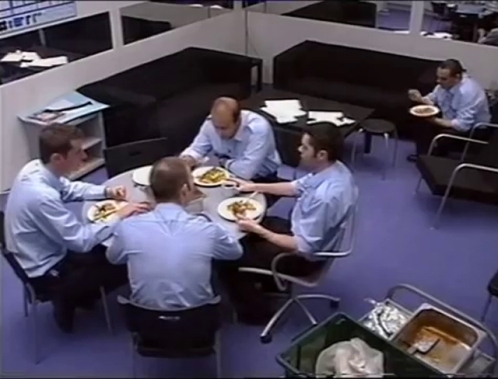
We intercut between Quarry in the mess, talking up the nice game of chess he had with his pal Edwards, and Edwards mocking what a loser he is. “He’s gonna have a breakdown!” laughs Petken. And so begins OPERATION MAYHEM, described by Suchet as “a sustained psychological assault” on Tom Quarry. After more mind games, telling Quarry they’ve heard a guard’s being demoted to prisoner — “pray to God it is not you” — they force open the cell door, trying to gaslight Quarry into thinking he left it unlocked; calling him a liar in front of everyone. But it’s a small set, and once they’re out, all they can really do is go into the guard quarters and make a cup of tea, forcing open the adjoining door, faux-casually whistling as they wander in. “They ain’t laughing at me now are they?” says Edwards, before realising they really are out of sugar. When the guards try to lock them in, Edwards lurches at the door and yanks it out of their hands, causing an emergency crisis meeting between the psychologists and the BBC’s team of ethical advisors.
At morning roll-call on Day Seven, the rebellious pair are persona non-grata with most of the other inmates, who were kept awake by their titting about. Cell 3’s Dave Dawson, practically invisible until now, yells at a still sleeping Edwards to get out of bed. “He has kept a low profile,” says Suchet, “but today, he is incensed.” With a sense that there’s no going back from last night, a meeting’s called, with Lord of the Flies rules; only whoever holds the ball of tinfoil may speak. Some want out, others want to continue, while Grennan is moved to tears about this “unforgettable experience” as a watching psychologist puts a hand on the other’s shoulder with an awed “this is amazing.” But highlight is the angry Dawson, who perfectly calmly, perfectly measured, in a thick Sunderland accent, calls out the bullying; “…certain people couldn’t give a flying rat fuck about anyone else… the people involved should be ashamed.”
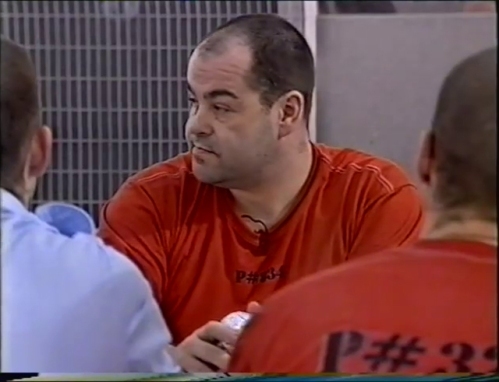
There’s a vote on how to continue, whether to end it all, or ditch the rules and live as one, commune style. The latter wins, and a joint mission statement to the psychologists lays out how they “aim to leave this place both as a group and as friends,” proposing a single self-governing society, with everyone pulling equal weight and with equal say. Two guards leave, before the remaining participants start this brave new world with a shared meal, guards in street clothes, and everyone taking their cleaning duties seriously for once. Almost everyone. Petken and Edwards refuse to do chores, playing pool rather than participate. “That,” says Dawson, “is why you’re not part of the group.”
The commune are sat around nicely playing Jenga and Kerplunk, but Edwards, Petken and Bimpson find no fun in order and civility. The three commence winding the others up, pointedly eating communal biscuits and sparking up in the non-smoking area. Quarry relates the fact that, if you play chess when you’re a bit pissed off, “apparently it accesses a part of your brain that you don’t normally use, causing it to swell and kill you… it’s a known fact.” Edwards and Petken laugh at him, and deem him “the next Michael Barrymore.” Later, they’ll bemoan the new chilled-out atmos, and Edwards suggests locking the others in. “That ain’t shit, is it?” says Petken. “I’m talking about causing a bit of distress to someone.”
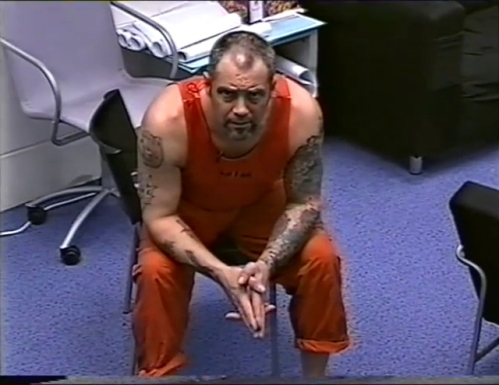
With no leaders, there’s a vacuum of power, and they float the idea of returning to the original premise, inmates and guards, only this time, with the pair of them in control. “No,” says Bimpson, “us three. Make them toe the line. I mean on the fuckin’ line. Get on with your food and get the fuckin’ hell back to your cell.” They seal the coup plan with a three-way fist bump, and stood in just his underpants, Bimpson addresses a camera — “Tomorrow, at first dawn, we’re having a military take-over.” He demands military uniforms, black berets and sunglasses, and is up alone at 4am, scribbling a manifesto for the new regime, stashing it in a kitchen cupboard then sleeping in the mess with a tea towel over his face to guard it.
Day Eight. After an hour’s sleep, Bimpson wakes everyone at six with a booming “RISE AND SHINE!” By now, he’s recruited Grennan into their plan, and as they’ve scoffed most of the supplies, a breakfast of manky sugarless porridge is the touch-paper for Bimpson’s coup — “controlled force works.” Through the whole experiment, Bimpson, Petken and Edwards, the largest men, have either subtly or not so subtly used physical intimidation, forever blocking passage, nose to nose, and now they’re asserting themselves as the law; the others all seated while Bimpson and Edwards patrol the table, arms folded, Petken in the guard station with his feet up.
“I was almost a fuckin’ pacifist,” barks Bimpson, “but I’ve gone back to the way I am. A predatory hunter.” He cites Edwards and Petken as fellow soldiers, comparing their plight as exiles in the commune to those who return from war and find themselves ostracised. “You’ve fucking nearly given your life there, and no-one gives a shit.” Mate, they jammed a door with a Nurofen box and made a cup of tea. Pacing like a tiger, Bimpson tells them they need a strong leader to “tread on a few of you fuckin’ arseholes,” and nobody has the balls but those three. Amid this rant, the camera cuts to Tom Quarry, face down on the table, flicking the tip of his tongue at a sheet of A4, utterly broken. As Edwards notices, eyes wide with glee, he nods his mates over to the sight of Quarry, as he begins tenderly kissing the paper the way one might a lover. When someone finally speaks up, to cut off Bimpson’s threats and posturing, it’s from the most unexpected place; Dave Dawson.
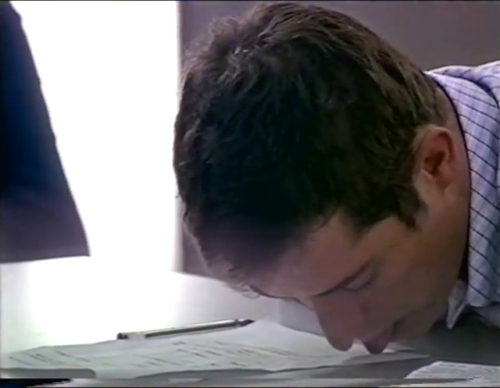
I consider what happens next right up there with the great reality TV moments; Brackie, David’s Dead, Dean Gaffney being sick on himself. The previously unassuming Dawson’s speech is perfect, powerful, and most importantly, very, very funny in its surprising foul-mouthedness. “Anybody can sit round here and be a cunt, and I haven’t, but from now, you’re gonna find out what I’m like when I’m a cunt, when I’m the one who fucking walks in there, starts drinking fucking orange, not offering any fucker else anything, I’m the one that’s gonna be fucking smoking all your tabs. Anybody around here can be the cunt, and not just you two, cos let’s face it, you two are acting like a pair of fucking cunts.” Nothing more to say, Dawson saunters off. “I rest my case!” laughs Edwards.
Later, this will result in one last exhausting verbal-barracking from a furious Edwards, confronting Dawson in his cell while he’s trying to sleep, after the humiliation of someone standing up to him. He’s noticed a “funny” attitude from Dawson, “and I’m not having it!” and says he’d have given him a good hiding on the outside. So now, the Three Amigos — plus Grennan — are planning an autocratic state, starting with a midday raiding party (“not using force”) to commandeer the bedrooms and showers, supplies, pool table, and basketball court, creating a “new country” and imposing their regime regardless of what anyone else thinks. A watching psychologist notes that he isn’t comparing Bimpson to Hitler, while doing exactly that; “I find it awful that we, perhaps inadvertently, have set up the conditions for the emergence of fascism.” They deem what they’re watching, their creation, “fascinating but absolutely horrible.”

Bimpson has gone full Colonel Kurtz, telling others to fuck off out of communal areas, and is clearly a man at war. Had the show gone full Stanford with no restrictions on getting physical, you get a sense weaker members of the cast would’ve been cable-tied and used as urinals. But five minutes before Bimpson’s axis sweep across the big house, psychologists come in to shut it down, 36 hours early. Contestants feel daylight for the first time in eight days, walking into the sun outside the George Lucas Stage, and in a classic example of ‘what happens in a specially-constructed prison set stays on a specially-constructed prison set’, everyone exchanges jubilant hugs, even Dawson and Edwards. The show’s conclusion, voiced by Suchet, is that “if we really want to stop tyranny, we need to prevent the vacuum of power that feeds it.”
As soon as the credits rolled, The Experiment was condemned to exist in a bubble outside of television itself, and be merely a psyche study, and not that it isn’t, but what else it is is a truly great piece of reality TV. Two years earlier, Nasty Nick was made a huge national villain for the crime (“very dirty plan”) of writing names down with a pencil, while Petken and Edwards slipped everyone by. Perhaps most the monstrous pairing in the genre’s entire history — worse than Speidi, worse than (“get”) Grace (“out!”) or David Van Day or Sam McGlone or Player 432 — the duo set about mentally dismantling another man, just for something to do. In all the academic studies that followed those eight days, what The Experiment‘s really crying out for is a genre-compliant revisit; a ‘where are they now?’ filling in the gaps. Was there a clear-the-air meeting when it was all over, or did everyone just go home traumatised? Did Petken and Quarry ever go for that pint? Did any of the main antagonists end up in a real prison? The latter, I can partially answer, as Bimpson’s now a film-maker/arts director, while Edwards qualified as a lawyer and went onto work in city finance.

It goes without saying you could not make this show today. With most modern reality contestants born after the self-aware line was crossed, within the first hour, you’d have some 20-year-old with calf implants and teeth like a nuclear blast taking hostages and livestreaming on a phone smuggled up his arse. Though the experiment had that shocking table-turning result which almost never happens, with those in power the ones demoralised and crushed, it was inevitable, given the selections of each group, and the total lack of options to enforce rules outside of blind compliance. Though it did achieve the impossible, in making the audience side with authority. At the very beginning, David Suchet describes the show’s objective — “To discover whether this system will turn good men into evil.” As viewers, it’s impossible to know whether or not, outside of the fake prison set, these were good men, nor is it our place to judge. But without a doubt, as reality TV contestants, they were absolutely superb.
…
This piece first appeared on my Patreon, where subscribers could read it a month before it landed here. If you’d like to support me for as little as £1 a month, then click here to help provide the world with regular deep dives about weird-bad pop culture, early access to my videos, my podcast, and all kinds of other stuff.
There’s a ton of content, including exclusives that’ll never appear here on the free blog, such as 1970’s British variety-set horror novella, Jangle, and my latest novel, Men of the Loch. Please give my existing books a look too, or if you’re so inclined, sling me a Ko-fi or some PayPal cash.
January 30, 2024
Millard’s Christmas Selection Box III
…
This video first appeared on my Patreon, where subscribers could watch it a month before it landed here. If you’d like to support me for as little as £1 a month, then click here to help provide the world with regular deep dives about weird-bad pop culture, early access to my podcast and videos, and all kinds of other stuff.
There’s over 660,000 words of content, including exclusives that’ll never appear here on the free blog, such as 1970’s British variety-set horror novella, Jangle, and my latest novel, Men of the Loch. Please give my existing books a look too, or if you’re so inclined, sling me a Ko-fi or some PayPal cash.
Russ Abbot at Christmas
…
This video first appeared on my Patreon, where subscribers could watch it a month before it landed here. If you’d like to support me for as little as £1 a month, then click here to help provide the world with regular deep dives about weird-bad pop culture, early access to my podcast and videos, and all kinds of other stuff.
There’s over 660,000 words of content, including exclusives that’ll never appear here on the free blog, such as 1970’s British variety-set horror novella, Jangle, and my latest novel, Men of the Loch. Please give my existing books a look too, or if you’re so inclined, sling me a Ko-fi or some PayPal cash.
January 21, 2024
First Night with Jamie Kennedy
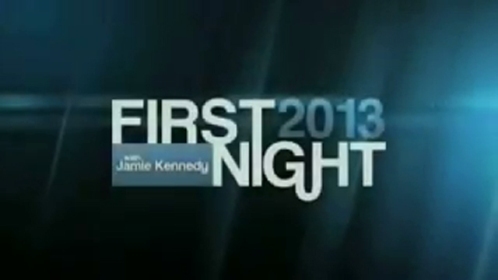
For me, the phrase ‘New Year’s Eve television’ sparks memories of Jools Holland, an enormous Sir Captain Tom looming out of the sky, and watching as Claudia Schiffer — introduced by Clive James as the World’s Most Beautiful Woman — is described by my gran as “an ugly old trout.” But amid all the year-end background noise, there’s one notable show, having earned a massively skewed ratio of infamy:viewers, thanks to a spectacular level of ineptitude, on both technical and creative levels.
Jamie Kennedy is best known as the guy from Scream who reels off all the slasher movie rules, but post-2000, his works can almost entirely be found in the sub-10% range on Rotten Tomatoes. Son of The Mask, white-rapper comedy Malibu’s Most Wanted, hidden camera prank show The Jamie Kennedy Experiment; Kennedy took such a battering, he even made a movie — 2007’s Heckler — devoted to confronting critics and asking why they were so mean. Had he decided to embrace the failure, First Night 2013 with Jamie Kennedy might’ve seemed like a subversive middle-finger to the haters, but instead, a man already struggling with bad reviews ended up fronting a show unanimously considered one of the worst of all time.
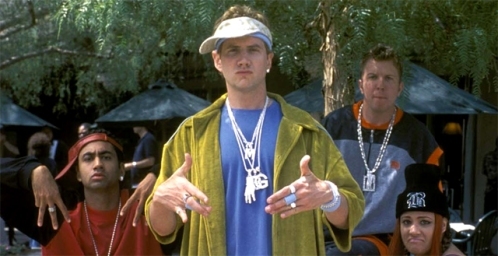
Aired on independent station KDOC-TV in Orange County, First Night kicked off at 11pm, New Year’s Eve, by which time the ball had already dropped on the traditional East Coast special, two hours earlier. Aiming for a block party feel, we’re on the street outside Grauman’s Chinese Theatre, having cleared away the Spider-Men and Buzz Lightyears charging tourists $10 for a selfie. Jamie Kennedy, done up all posh in a suit, opens with a monologue, on a small stage to an even smaller, disinterested crowd, idly chatting with each other while he shouts gags about Mark Zuckerberg, and Snooki giving birth to a bottle of tan. Musicians in hoodies mill about behind, plugging things in and setting up equipment like he’s not even there, giving Kennedy the vibe of a roadie warming up early arrivals before the proper show starts.
Topical material serves as damning indictment of an era which took its lead from Perez Hilton; relishing in the hounding of famous young women, and obsessively hate-watching tabloid reality television. “You guys like Honey Boo Boo?” and “You guys follow Lindsey Lohan?” reeling off the latter’s overly-documented calamitous year and telling us “honestly though, I’d still hit, (pointing at man in crowd) you know you’d hit too sir, you know you would hit!” He berates the audience for not laughing at a Kanye impression — “Beyoncé had one of the best hip hop pregnancies of the year!” — and fails to win them round with “rumour has it the baby’s first sex-tape is gonna hit any day now!”
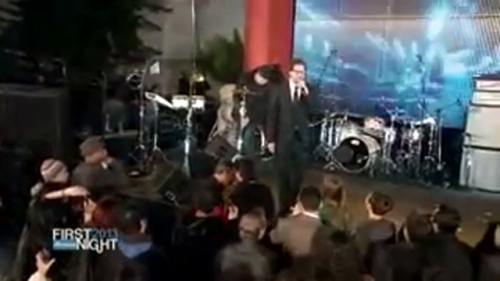
In spite of Kennedy’s resume, this seems like a man trying stand-up for the very first time, and to flatly describe the act gives one the air of a policeman reading out a statement in court. ‘At three minutes, Kennedy mispronounced “Gangnam Style.” He then complimented a man in the front row with “you’ve got great hair, dawg.” At three minutes-forty seconds: “now when you hear the words ‘Asian rapper’ you won’t think of the little plastic bag that holds your fortune cookie. You get it?” Corroborating statements from witnesses confirm the defendant then began a joke with the line “percentages had a big year in 2012…”’
It’s a set even Adger Brown would shake his head at, deserving of a 10,000 word dissection all of its own, with set-ups like “how many of you guys like your new technology products?” and “boy bands are all the rage this year!” He’ll miss-speak the word “clear” as “queer” and have a laugh about it; he’ll get paid to say on television “Kirsten Stewart used Apple Maps to find Robert Pattinson’s hotel room and ended up in Rupert Sanders’ crotch!” Prince Harry’s family jewels, Fifty Shades of Grey, Lance Armstrong’s bollock, “hashtag too soon!” — Jamie Kennedy’s chosen path and identity as a comedian is equivalent to a blind man with dreams of being a bus driver, irregardless of consequences. But First Night is packed with celebrities too, told “Shannon Elizabeth’s breasts are here!” and watching New Year video shout-outs from Bob Saget, Tony Hawk, Soulja Boy, and Shaq, who makes truck horn noises with his mouth.
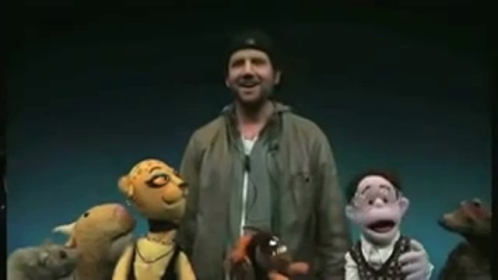
Shannon Elizabeth — all of her, not just the breasts — is interviewed by Stu Stone, a man whose big yellow-lensed sunglasses never come off, even though it’s outdoors and midnight in December. Stone, previously one of Donnie Darko’s classmates, was Kennedy’s sidekick in MTV reality series Blowing Up, which focussed on Kennedy’s attempt to become a rapper, with the pair releasing a tie-in album. He asks Elizabeth what 2013 will bring, as she excitedly promotes a jewellery line she’s starting with her cousin. But soon it’ll hit midnight, and wonders Stu, “is there a New Year’s kiss for Shannon Elizabeth?!” So too, MTV Live‘s Jessi Cruickshank queries Drake Bell on the important business of that first kiss. He won’t say who, only that there’ll be “plenty of tongue.” “Someone’s getting lucky with a nine-time Kid’s Choice Award winner,” squeals Jessi, “I hope you’re over 18!” Bell’s career ended in 2021, after an incident with a minor.
Stu’s in the ‘VIP section’ amid a blackjack game, breathlessly promoting Commerce Hotel and Casino, as Adam Pearce the wrestler (no relation to Billy), there for some reason, pounds his fists on the table. Commerce Casino are one of the night’s sponsors, their branding all over proceedings like a fading tribal tattoo. As part of the deal, Kennedy shot three sketches, one which resulted in First Night‘s worst critical backlash, as he and a bunch of white extras play ‘Mayans’ in classic Red Indian Halloween outfits, having bankrupted themselves before the coming 2012 apocalypse.
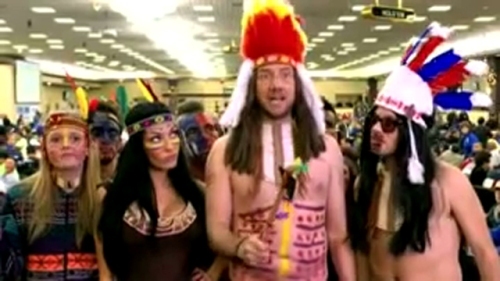
The promotional dialogue is perhaps at its most subtle here. “My chief, we can win our money back if we enter the Los Angeles classic poker tournament at the commerce hotel and casino!” “Why would we go to Vegas when we have the beautiful commerce hotel and casino, right off the five?” Why indeed? The final sketch sees a casino heist; the Commerce Casino, if you can believe it! But Jamie’s crew keep getting distracted because it’s so great. “Why are there so many entertainment options here at Commerce Casino? We should’ve robbed another casino!”
A pre-taped interview between Kennedy and Olympic athlete Alison Felix has him tripping over in the sandpit, asking if his nob looks big in tiny shorts, and putrid banter about the amount of condoms in the Olympic village. Then it’s over to Bridget Marquardt, one of Hef’s birds on Girls Next Door, at a nearby night club, shouting at the top of her lungs into another mic which doesn’t work. In the volume one would use when trying to alert passers-by you’re locked inside a portaloo, she screams “DON’T THINK THAT I’VE FORGOTTEN ABOUT THOSE CARLS JR TURKEY BURGERS!”
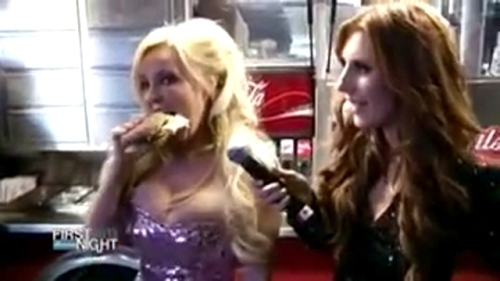
She’s not kidding, in a bit demonstrating again how beholden they are to sponsors, with Bridget and Jessi at a Carls Jr. food truck (when a producer can be heard shouting “NO NO NO!”), where Bridget will eat the turkey jalapeno burger we’ve seen over a dozen commercials for. Jessi tells her “you’re very sexy lady, that’s a very sexy burger,” and lays down the challenge — “let’s see how sexy Bridget can eat this burger.” It’s twenty-five to midnight, through your walls, the muffled sounds of neighbours’ parties, and in the dim corner of your living room, a woman in a sequinned dress shivering in front of a food truck makes seductive eyes at the camera while stuffing a huge, contractually obligated burger into her gob. “This is really impressive!” coos Jessi, “I’m a vegetarian and I’m aroused, so…”
In another skit, Jamie promotes “green stuff” by pointing down a woman’s cleavage — “I know you’re feeling the draft, know what I’m sayin’?” When we return to Stu (referring to himself as “Stu the Jew”), he’s in the shadow of a statuesque model-looking lady from a clean energy company — “I never knew green could be so sexy!” But how can we can improve the energy efficiency in our homes? “Hi Stu, it is a pleasure to meet you,” she replies, bumbling in a Bond villain accent through a lengthy speech about energy efficiency she clearly spent the Christmas period memorising. Waffle about double-paned windows and AC systems, “and many more” is wasted on the live crowd, as the mic’s doing a Norman Collier tribute act. Behind her, a man chuckles as he nibbles on a party blower.
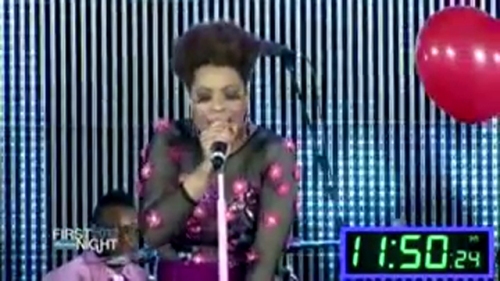
Back from a break, we hand over to a swaying Macy Gray, trying to rouse the crowd into a “heyyy, hooo!” as someone films on their Blackberry. A very slurry performance, proper ‘auntie doing hen night karaoke’, there’d be speculation she’d had a few. Her mic too, dies mid-song, ambling through three numbers and making repeated references to the silence of the crowd, as a lone red balloon floats by, implying Pennywise is about to make a welcome appearance. She closes her set with an appropriate “bottoms up!” leaving just three minutes to midnight.
Jamie bellows Macy’s name into the mic over and over again, presumably just excited to find one that works, before speaking into his own and finding that it’s dead. With two minutes of the year remaining, everyone’s excited to do the money shot of all New Year’s Eve specials; the countdown. Then Jamie realises — on air — they don’t have a clock to show the audience, and are incapable of even projecting one on the big screen, shouting “Where’s our clock? Where’s our clock?” It’s left to Stu taking his phone out of his pocket to check, and with everyone lined up on stage, Stu starts a fifteen second countdown — at 11:59:55. While the rest of the West Coast lets off fireworks and party blowers, Jamie and co finally cheer in the New Year at ten seconds past midnight.
Cut to Bridget in the club, embracing a skeezy guy in a kiss, plastic beer glass gripped in his middle fingers as he throws a devil horn salute at the camera. Macy’s pianist plays Auld Lang Syne, but nobody joins in, everyone stood round not sure what to do, tech crew still pottering in the background. It feels like a chaotic ending, but we’re only halfway through the show. Stu chats with a drunk in the audience, Jerry from New Jersey whose resolution is “I want to be home.” Yeah, I bet. A frat bro drops an f-bomb and gets 7-second-delayed, Stu quickly moves onto a woman who turns out to be bro’s shocked mother. Her resolutions? “I don’t know what they are yet.”
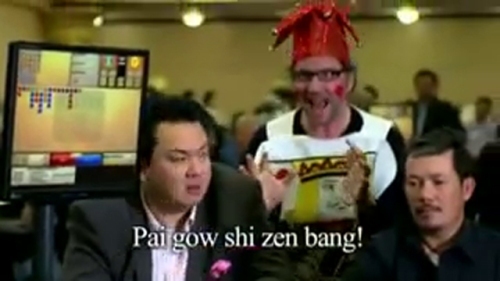
A dreadful droning Bone Thugs-N-Harmony performance consists of saying “first of the month” over and over again for about eight minutes, before Stu asks one of them if he’s familiar with “Jamie Kennedy’s brand of comedy,” or “a fan of Malibu’s Most Wanted?” Back to Jessi, yammering into another mic which isn’t working, as Jamie’s off-camera voice berates the audio technician, “Shane, you gotta get the bottom button, dawg, bottom button!” At the club, Bridget’s “ready to get my drink on!” as the camera pans up to reveal a half-naked dancer dangling from the ceiling astride a giant bottle of champagne, dousing revellers with a piss-like arc. “HOLY COW!” cries Bridget “LOOK AT THAT CHAMPAGNE! I’M SO EXCITED!”
The endless promotional stuff is the closest real-life example yet of Alan’s Rover shilling in Knowing Me, Knowing Yule, its advertising relentless, and veering the tone back and forth between “yo, bro!” attempts to recapture boozy college days hedonism and earnest shills for sponsors’ wares, like being stopped mid-threesome by Parky knocking on the door to offer a free pen. Regard when Jamie abruptly announces he wants to be more healthy in 2013, while stood with another pair of glamorous women; women who happen to be representatives from the non-profit GuardHeart. He’s open-mouthed at the camera as another heavy accent — this time in a fur coat — tells us “Out of three people, one has been diagnosed with heart problem [sic], so we’re here to raise awareness.” Absolutely scintillating television at half past midnight on New Year.
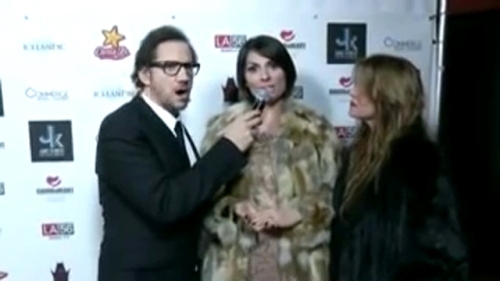
At the end of her spiel, Kennedy tells her she looks good, and that “my heart needs a little guardin’.” His mic flitting between silent and deafening, he adds “I got pricked today,” pulling open his shirt. Given these representatives all have a certain ‘look’, it’s impossible not to assume the infomercials had the caveat of “fine, I’ll talk about it, but only with a hot chick!” In a final skit, Jamie’s surrounded by the cast of Brian Henson’s Stuffed and Unstrung — a kind of rude Muppet show — as a load of puppets make rape jokes and ask what Courtney Cox’s tits are like. Events come to a close with everyone crammed onstage, and when Jamie wishes us a Happy New Year, a fight breaks out behind him, as someone appears to shove Adam Pearce, who angrily wades in and starts swinging.
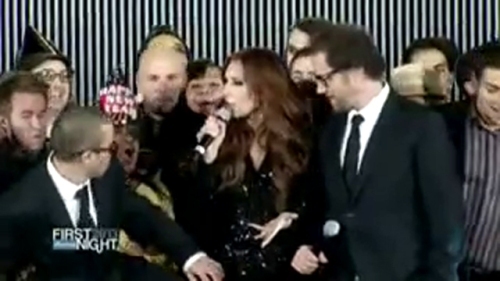
First Night is practically impossible to find in full now, and even my copy, snagged some years back, appears to be a slightly incomplete re-run, as it’s missing a few reported moments, including more of the end-credits brawl, plus Kennedy’s interview with a pair of black women, one whose New Year’s resolution was “to get rid of all my haters,” while the other’s “going white, to keep my vagina very tight.” After clips of its worst moments blew up on Twitter, Kennedy defended the show to the NYTimes, claiming he “wanted to make almost an anti-New Year’s Eve show,” and that “I didn’t stab nobody, I didn’t shoot nobody. I just made a New Year’s Eve special. Is that so bad?” I mean… yes. Having experienced it, I can confirm First Night totally lives up to its rep, dawg, as a show which made you wish the Mayans had been right.
…
This piece first appeared on my Patreon, where subscribers could read it a month before it landed here. If you’d like to support me for as little as £1 a month, then click here to help provide the world with regular deep dives about weird-bad pop culture, early access to my videos, my podcast, and all kinds of other stuff.
There’s a ton of content, including exclusives that’ll never appear here on the free blog, such as 1970’s British variety-set horror novella, Jangle, and my latest novel, Men of the Loch. Please give my existing books a look too, or if you’re so inclined, sling me a Ko-fi or some PayPal cash.



